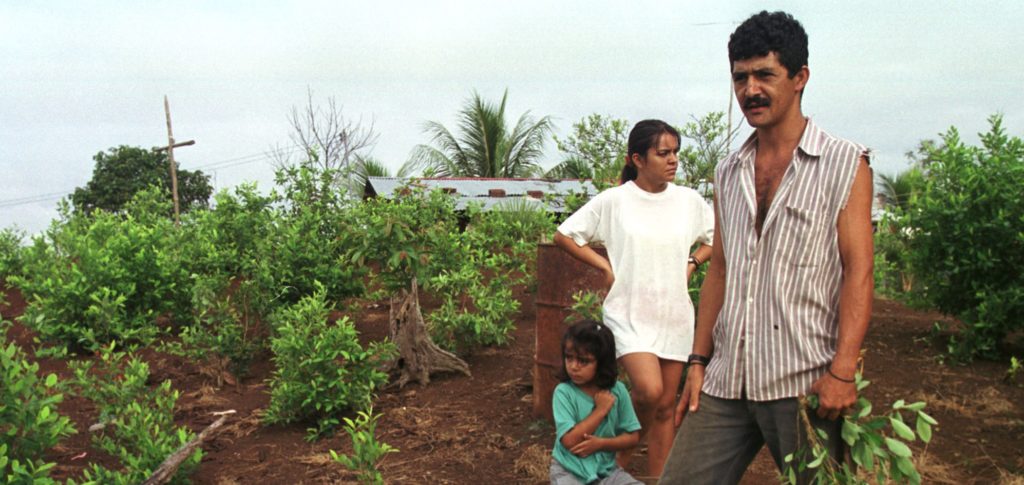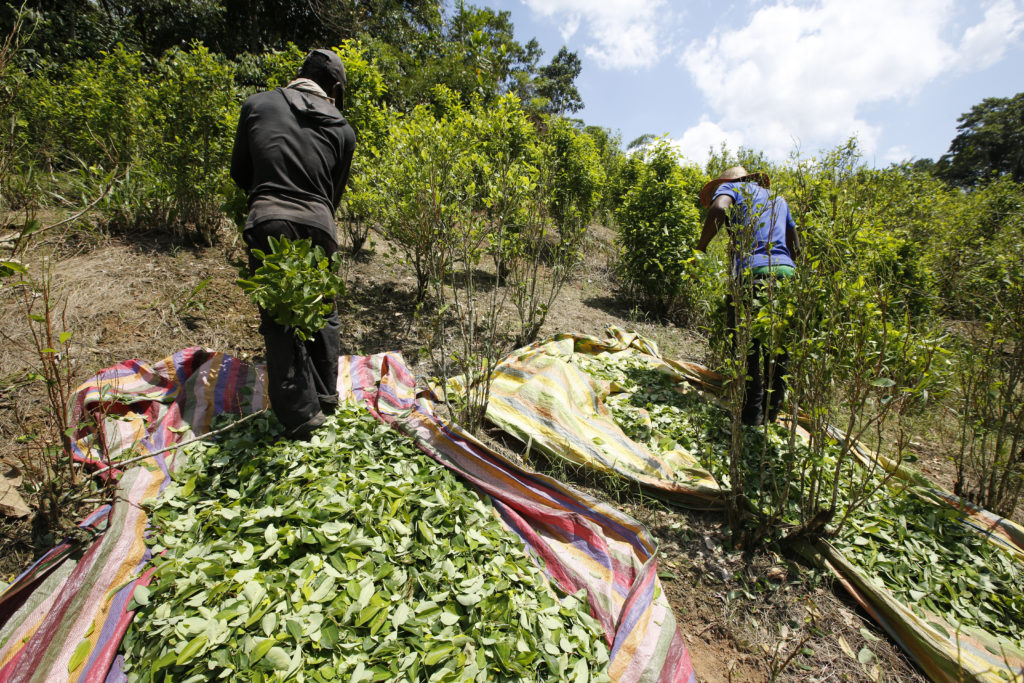(AP Photo/Fernando Vergara)
(AP Photo/Fernando Vergara)
This article was originally posted on https://adamisacson.com/
The votes are counted in Colombia. Today’s elections were not a “second referendum” on the 2016 peace accord with the FARC: issues like corruption, a semi-collapsed healthcare system, and Venezuela’s crisis came to the fore.
Nonetheless, the coalition that criticized negotiations to end Colombia’s conflict with the FARC, and narrowly won an October 2016 plebiscite to reject the accord, is now in power.
In May of last year a prominent voice in the plebiscite’s “No” coalition, Fernando Londoño—who served as Álvaro Uribe’s first minister of interior and justice, and is now a right-wing radio host—said that “the first challenge” of Iván Duque’s and Uribe’s political party, the “Democratic Center,” is “to rip to shreds this damned paper that they call the final accord with the FARC.” Londoño had also argued that Duque was insufficiently rightist to be the Democratic Center’s standard-bearer, though—so what he says doesn’t tell us what Duque will do.
With Duque and his party now in power, Colombia will not be going back to war with the FARC.
President Duque will bend the peace accord, both by seeking modifications and failing to act, but he won’t break it in a way that causes thousands of demobilized guerrillas to take up arms again. But neither will Duque’s government carry out the parts of the accord that aren’t about the FARC, but instead about guaranteeing non-repetition of armed conflict in Colombia.
Duque has promised to make changes to the accord’s transitional justice mechanism—still in its infancy—which intends to hold accountable people on both sides, guerrilla and government, who committed war crimes and crimes against humanity. It took the government and guerrillas 19 months to negotiate this system, the Special Jurisdiction for Peace (JEP). It is deeply unpopular with the No coalition, and with most Colombians, because it offers weak punishments to murderers and kidnappers in exchange for confessions and reparations to victims. Duque calls it a “monument to impunity.”
Duque wants to strengthen the penalties handed out to ex-guerrillas, to make them look more like prison, or at least like life in an agricultural penal colony. He is unlikely to be able to do this, as Colombia’s highest courts have already approved the structure agreed in the accords. Should he succeed, though, the demobilized guerrillas will surely reject a punishment that resembles that normally meted out to combatants defeated on the battlefield, which the FARC were not.
7,100 ex-guerrillas have registered with the JEP; with the promise of real jail time, many if not most would melt away into the jungle. Duque doesn’t want this, so he probably won’t pursue a tightening of penalties.

Coca farmer Wilmar Ospina and his family look over their once fumigated coca field that’s growing back in La Hormiga, in the southern Putumayo state, Colombia’s main cocaine producing region, Friday, Nov 2, 2001. (AP Photo/Scott Dalton)
Duque has also proposed a constitutional amendment to ban amnesties for narcotrafficking. The peace accord considers former FARC members’ drug trafficking on a case-by-case basis: if the JEP finds evidence that a former fighter gained personally from trafficking, he or she must pay the regular criminal penalty. If all the proceeds went into the FARC’s war effort, though, the trafficking would be amnestied as a “political crime.” (Any trafficking after November 2016, when the peace accord went into effect, cannot be amnestied and is a regular crime.) Duque would do away with that amnesty—but almost definitely cannot do so retroactively. Any constitutional change would apply to future peace processes, and wouldn’t apply to the ex-FARC.
Duque also strongly opposes the accords’ allowing ex-FARC members to hold political office—including five automatic seats in each of Colombia’s two houses of Congress until 2026—before they’ve paid their penalties for war crimes. This part of the accord does raise the absurd likelihood of former guerrilla leaders starting and ending their days in “restricted liberty,” but serving in Congress, or perhaps mayors’ offices, in between. Altering it, though, might cause some of the FARC’s most prominent leaders to abandon the process, bringing many of their followers with them. The number of dissidents this would create would be lower, though, than those created by an attempt to toss ex-FARC members into regular prison.
Despite the red-meat rhetoric of the more vociferous No coalition leaders, then, Duque is most likely to walk a fine line on the peace accord’s transitional justice measures. He will seek some retroactive changes that look tough, but will avoid taking steps that send thousands of humiliated ex-guerrillas back into combat.
Instead of striking dramatic blows against the accord, it’s more likely that Duque and his coalition will kill it through neglect.
Casting the accord adrift, failing to take action and failing to spend money, will bring much the same end result as dramatically tearing it to shreds.
The peace accord envisions a 15-year implementation period. Colombia’s Constitutional Court has made clear that it is the law of the land and that the country’s next three presidents must implement it. But the accord can be slow-walked to death.
The accord’s chapter on rural reform and development would take up 85 percent of the foreseen cost of implementation. It promises measures to benefit smallholding farmers, ranging from a national mapping of landholdings, to building roads and irrigation systems, to offering credit, healthcare, and food security in the countryside. Duque’s coalition, though, is made up of large landholders who benefit from the current rural status quo, and urban-dwellers who would rather see resources go to urgent needs in cities, where 77 percent of Colombians live. They are unlikely to devote billions of dollars to the countryside just because the FARC-Santos accord says they must.
President Santos’s government drew up an ambitious plan for increased state presence and basic government services in 170 municipalities (or counties—Colombia has 1,100) where armed conflict and coca cultivation have been most intense. The “Development Plans with a Territorial Focus” (PDETs) have been the subject of thousands of meetings between Bogotá officials and rural communities, raising expectations in long-abandoned zones even while only the most incipient investments have begun to arrive.
But Santos never got around to introducing the legislation necessary to implement most of the rural accord. It’s most unlikely that this will be part of Duque’s agenda.
Nor is it likely that the PDETs will be generously funded, if they’re continued at all. Hopes are dim for a greater state presence in Colombia’s conflictive and neglected countryside, other than perhaps a presence of more soldiers and police.
The same goes for the peace accord’s provisions (chapter 4) promising a new approach to coca cultivation. Smallholding peasants who grow coca are the weakest and least profitable link in the cocaine production chain, but get-tough policies have tended to target them because coca bushes are a lot easier to find than cocaine shipments or financial flows. Following the accord’s principle of attacking the root causes for coca cultivation, the Santos government sought to sign agreements with more than 100,000 coca-growing families around the country, promising two years of assistance in moving to legal crops in exchange for voluntary eradication of their coca. This program has already been struggling, and Duque is unlikely to continue it: he promises a large-scale campaign of forced eradication, perhaps to include (if courts allow it) a resumption of aerial herbicide fumigation, whether by aircraft or small drones.

In this March 3, 2017 photo, workers harvest coca leaves in Puerto Bello, in the southern Colombia’s state of Putumayo. (AP Photo/Fernando Vergara)
Breaking the Santos government’s promises to coca-growing households, and ramping up forced eradication, will make Washington happy; policymakers in both the Obama and Trump administrations have been alarmed by record levels of coca and cocaine production in Colombia’s ungoverned rural zones. But we can also expect a sharp rise in violent confrontations in those zones, as growers’ associations that were working on slow-moving solutions with one government suddenly find themselves facing eradicators and herbicides from the next government.
It’s well-documented that the outgoing government of Juan Manuel Santos was not implementing the FARC accord with great energy. But now, hopes of full implementation are all but dashed. Most of the accord’s 310 pages may end up as unkept paper promises.
If that indeed happens, this will be a tragic squandering of a historic opportunity. What the No coalition misses is that the FARC accord wasn’t a gift to the FARC. The ex-guerrillas got little—no land reform, no constitutional amendments, no amnesty, not even land for ex-combatants—and they have since suffered utter defeat at the ballot box, their 74 congressional candidates winning a combined 0.3 percent of the vote in March.
Instead, the FARC accord, especially its chapters on rural development, coca, victims, and political participation, offered an opportunity to make Colombia a modern, prosperous country.
It offered—still offers—a blueprint for replacing feudalism with rules-based market capitalism in a countryside that has been the source of ills ranging from coca to armed violence to deforestation.
For a moment in time, the accord buys time for government to “enter” rural Colombia without having to shoot its way in, and to provide the rule of law and other public goods that all states are supposed to supply. That moment in time is fleeting—rising violence data makes that clear—but can be prolonged by having the state be present, keep promises, and punish corrupt or abusive behavior.
Slow-walking that plan, or defunding it, blows this opportunity to solve generations-old security and governance challenges in rural Colombia. The moment will end. In fact, the door into Colombia’s ungoverned territories is already closing as new criminal groups and guerrilla dissidences add to their numbers. Duque’s No coalition risks slamming the door shut, with results that Colombia would feel for a generation.